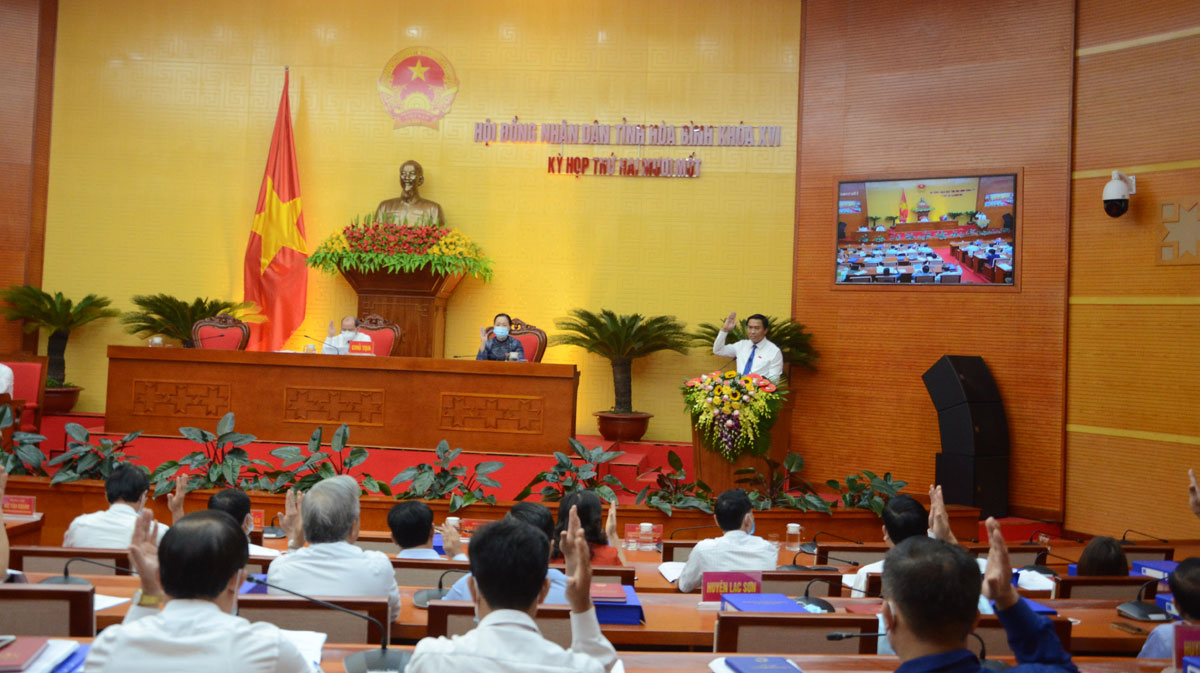
(HBO) - The 21st meeting of the 16th provincial People’s Council for the 2016 – 2021 tenure, convened on April 28 with the presence of Secretary of the provincial Party Committee Ngo Van Tuan. The event was chaired by Chairman of the provincial People’s Council Bui Duc Hinh and vice chairpersons Nguyen Thi Cam Phuong and Vo Ngoc Kien.
 Delegates vote to adopt resolutions submitted to the meeting.
Delegates vote to adopt resolutions submitted to the meeting.
In his opening remarks, Hinh, who is also Vice Secretary of
the provincial Party’s Committee, said the 21st sitting focuses on
seeking feedback on a medium-term public investment allocation plan for the
next five years and consider the in-principle approval for 10 transport
projects. They are very important issues for the province’s socio-economic
development, he said.
Provincial People’s Council deputies then discussed the
medium-term public investment allocation plan, with focus placed on identifying
sources of public investment for the projects and reviewing a capital
allocation plan for 2021 – 2025.
In the morning’s session, the meeting adopted a total of 11
resolutions on various matters, including the medium-term public investment
allocation plan for 2021 – 2025; in-principal approval of a regional road
linking Hoa Binh and Hanoi and Son La Expressway’s section connecting Hoa Binh
and Moc Chau; upgrade of Vay Nua – Tien Phong inter-commune road (Da Bac district),
road linking Ho Chi Minh Road and Thanh Ha Industrial Park (Lac Thuy district),
Provincial Roads 440 and 450 and Road 446; construction of the first phase of
roads linking Phu Cuong – Go Lao (Mai Chau district), Quang Tien – Thinh Minh
(Hoa Binh city) and Luong Son – Xuan Mai.
Concluding the event, Hinh asked all-level administrations
to effectively enforce the resolutions for the accomplishment of all
socio-economic development goals this year and beyond./.
The Standing Board of the Hoa Binh provincial Party Committee has agreed in principle on a proposal by the Standing Board of the Party Committee of Hoa Binh city to gather feedback on the city’s 1:2000 zoning plan, which forms part of its broader urban development strategy.
Hoa Binh province has made notable progress in public administration reform and digital government development, with the satisfaction index among citizens and businesses reaching over 84%, according to recent government evaluations.
Thanks to great efforts by local authorities in recent times, the governance and public administration performance of Mai Chau district has been significantly improved.
In the afternoon of June 6, the Party Committee, the People's Council, the People's Committee and the Fatherland Front of Lac Son district solemnly held a meeting to celebrate the 139th anniversary of the district's founding (1886–2025) and the 79th anniversary of the establishment of the district's Party Committee (1946–2025). There was the attendance of Mr. Bui Van Thang, the Vice Chairman of the Provincial People's Council; Mr. Quach Tat Liem, the Vice Chairman of the Provincial People's Committee; Ms. Dang Bich Ngoc, the Deputy Head of the National Assembly Delegation of the province; as well as the former leaders of the province and district through various periods, who are the natives of the district.
Implementing the Politburo’s Resolution No. 57-NQ/TW on breakthroughs in science – technology, innovation, and digital transformation is a golden opportunity for the northern mountainous province of Hoa Binh to renew growth model, improve competitive edge and shorten digital gap.
Resolution 57-NQ/TW, issued by the Politburo on December 22, 2024, identifies sci-tech, innovation, and digital transformation as strategic breakthroughs to build a developed and prosperous nation. In Hoa Binh province, this spirit is not just a slogan, it’s being put into action through concrete initiatives that form a "new development triangle”: digital citizenship, digital economy, and digital administration.



 Delegates vote to adopt resolutions submitted to the meeting.
Delegates vote to adopt resolutions submitted to the meeting.